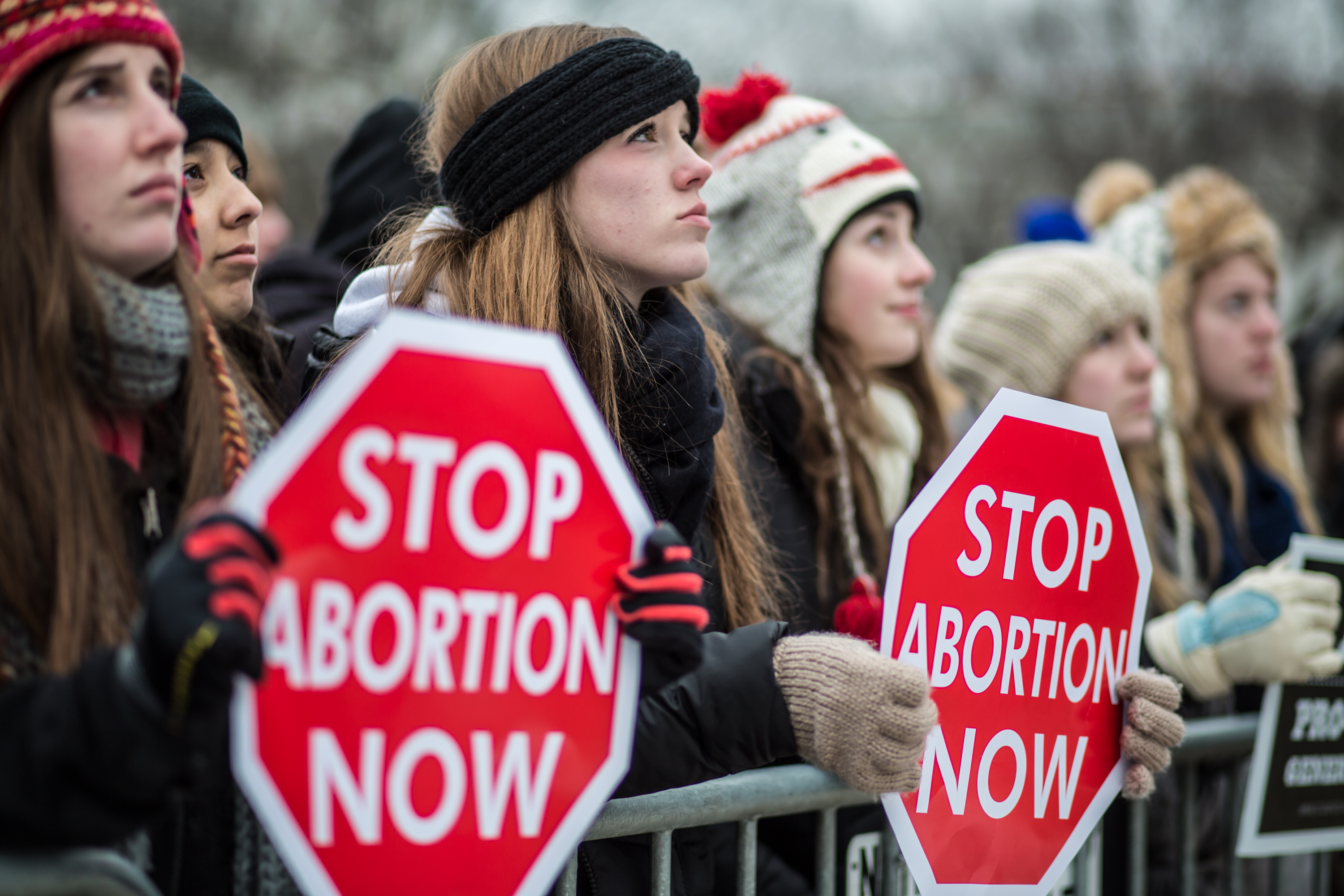Why is the Women's March excluding pro-life women?
Shouldn't the Women's March on Washington welcome all women?


Liberal feminists need to decide which they value more: ideological purity or political victory.
For the second time in as many weeks, a controversy has broken out over who should be included in the Women's March on Washington, the protest scheduled for Saturday, the day after Donald Trump's presidential inauguration. Last week The New York Times reported that some white women were being made to feel unwelcome at the march by demands that they "check their privilege" and "listen more and talk less" when non-white women speak about the unique burdens they face as members of not just one but of two or more oppressed groups.
And now an article by The Atlantic's Emma Green about the participation of pro-life women in the march has provoked such a fury among leading liberal feminists that organizers have removed a pro-life group (New Wave Feminists) from the march's list of hundreds of "partners." The reason? March organizers say their "platform is pro-choice" so an "error" was made in inviting the pro-life group to be a partner.
The Week
Escape your echo chamber. Get the facts behind the news, plus analysis from multiple perspectives.

Sign up for The Week's Free Newsletters
From our morning news briefing to a weekly Good News Newsletter, get the best of The Week delivered directly to your inbox.
From our morning news briefing to a weekly Good News Newsletter, get the best of The Week delivered directly to your inbox.
Others expanded on the explanation. Writer Amanda Marcotte tweeted that "you cannot be anti-choice and feminist" and that opposing abortion is a "misogynist act." Author Jessica Valenti was likewise "horrified" to hear about the involvement of a pro-life group in the march because "feminism is a movement for justice — [and] abortion access is central."
It is probably the case that most of the women planning to travel to the nation's capital for the purpose of participating in the march are pro-choice. Many of them probably also agree with Marcotte and Valenti in defining feminism in terms of absolute support for abortion rights. But of course, millions of pro-life American women don't define feminism this way at all. Some of them (a "few hundred," according to Green's piece in The Atlantic) were so appalled by Donald Trump's statements about and alleged behavior toward women that they planned to join the march in an act of solidarity with women from all walks of life, races, creeds, faiths, colors, classes, and ideologies.
Does it make sense for march organizers and supporters to urge such women to stay home? Or to ensure that if they do attend, they will be treated with contempt for espousing a version of feminism that's defective, oxymoronic, and awash in false consciousness and self-loathing?
I think pro-life women deserve far more respect than this, but that's beside the point. I'm a man and so a good number of pro-choice feminists will dismiss out of hand anything I say on the subject.
A free daily email with the biggest news stories of the day – and the best features from TheWeek.com
What they may find more difficult to wave away is the suggestion that they begin thinking more like people out to build a successful political movement and force of opposition to the incoming president and his party in Congress, and less like members of a factional ideological sect.
In a democracy, successful political movements go broad. They are ecumenical, seeking to bring as many people as possible into an inclusive coalition, because that's how elections are won and mandates are forged, and because they understand that politics involves compromise and building bridges of partial agreement and commonality with those who disagree on some important issues but not on others. (Pro-life feminists tell Green that they've been inspired to attend the march by "cultural misogyny, the state of education and health care, and a desire for their own daughters to be able to lead.")
Sects (whether political or religious) have different priorities — like upholding ideological purity, enforcing conformity to official doctrine, policing the boundaries of acceptable opinion, and excommunicating those who fail to toe the party line. They prefer losing to compromising their principles.
When a march has hundreds of partners, what harm is done by including a single organization that opposes abortion? When many thousands plan to march in a rally of solidarity, why express disgust at a few hundred who dissent from the views that overwhelmingly dominate the event? When the rise of Donald Trump may be shattering the bonds that have tied so many pro-life women to the Republican Party, why not do everything possible to encourage these women to make a complete break and join the opposition?
The pursuit of political self-interest points in the opposite direction from the one taken in response to Green's story. Which means that march organizers and their allies aren't pursuing their political self-interest. They're acting like ideological commissars.
Enforcing standards of purity can be rewarding in all kinds of ways. But winning a hard-fought political contest usually isn't one of them.
Damon Linker is a senior correspondent at TheWeek.com. He is also a former contributing editor at The New Republic and the author of The Theocons and The Religious Test.
-
 Will AI kill the smartphone?
Will AI kill the smartphone?In The Spotlight OpenAI and Meta want to unseat the ‘Lennon and McCartney’ of the gadget era
-
 Must-see bookshops around the UK
Must-see bookshops around the UKThe Week Recommends Lose yourself in beautiful surroundings, whiling away the hours looking for a good book
-
 A Nipah virus outbreak in India has brought back Covid-era surveillance
A Nipah virus outbreak in India has brought back Covid-era surveillanceUnder the radar The disease can spread through animals and humans
-
 The billionaires’ wealth tax: a catastrophe for California?
The billionaires’ wealth tax: a catastrophe for California?Talking Point Peter Thiel and Larry Page preparing to change state residency
-
 Bari Weiss’ ‘60 Minutes’ scandal is about more than one report
Bari Weiss’ ‘60 Minutes’ scandal is about more than one reportIN THE SPOTLIGHT By blocking an approved segment on a controversial prison holding US deportees in El Salvador, the editor-in-chief of CBS News has become the main story
-
 Has Zohran Mamdani shown the Democrats how to win again?
Has Zohran Mamdani shown the Democrats how to win again?Today’s Big Question New York City mayoral election touted as victory for left-wing populists but moderate centrist wins elsewhere present more complex path for Democratic Party
-
 Millions turn out for anti-Trump ‘No Kings’ rallies
Millions turn out for anti-Trump ‘No Kings’ ralliesSpeed Read An estimated 7 million people participated, 2 million more than at the first ‘No Kings’ protest in June
-
 Ghislaine Maxwell: angling for a Trump pardon
Ghislaine Maxwell: angling for a Trump pardonTalking Point Convicted sex trafficker's testimony could shed new light on president's links to Jeffrey Epstein
-
 The last words and final moments of 40 presidents
The last words and final moments of 40 presidentsThe Explainer Some are eloquent quotes worthy of the holders of the highest office in the nation, and others... aren't
-
 The JFK files: the truth at last?
The JFK files: the truth at last?In The Spotlight More than 64,000 previously classified documents relating the 1963 assassination of John F. Kennedy have been released by the Trump administration
-
 'Seriously, not literally': how should the world take Donald Trump?
'Seriously, not literally': how should the world take Donald Trump?Today's big question White House rhetoric and reality look likely to become increasingly blurred
